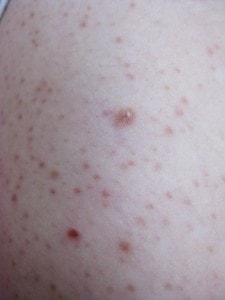Hyperpigmentation is a common condition that occurs when patches of skin darken, usually on the face, hands, and arms. Although hyperpigmentation is usually harmless, many women consider it aesthetically unappealing. Furthermore, it can sometimes be difficult to distinguish between hyperpigmentation and skin cancer, which is why any unusual darkening of the skin should be taken seriously. If you notice dark patches or spots appearing on your skin, you should talk to a doctor or dermatologist to ensure that it is actually harmless and also to find out about possible treatment options. We will look at why hyperpigmentation happens and what treatment options you may have for addressing it.
What is ?
 Hyperpigmentation happens when melanin production in the skin increases. Melanin is the substance in your body that helps regulate your skin’s pigment. Hyperpigmentation can occur in women (and men, for that matter) of any race. While one of the most common forms of hyperpigmentation is referred to as age spots, the truth is that hyperpigmentation can occur in both young and old alike. Furthermore, hyperpigmentation is often more the result of UV exposure or hormonal changes, such as those brought about by pregnancy, use of birth control pills, or Addison’s disease, rather than with aging specifically. Hormone replacement therapies, Cushing’s disease, and hypothyroidism can also cause hyperpigmentation.
Hyperpigmentation happens when melanin production in the skin increases. Melanin is the substance in your body that helps regulate your skin’s pigment. Hyperpigmentation can occur in women (and men, for that matter) of any race. While one of the most common forms of hyperpigmentation is referred to as age spots, the truth is that hyperpigmentation can occur in both young and old alike. Furthermore, hyperpigmentation is often more the result of UV exposure or hormonal changes, such as those brought about by pregnancy, use of birth control pills, or Addison’s disease, rather than with aging specifically. Hormone replacement therapies, Cushing’s disease, and hypothyroidism can also cause hyperpigmentation.
Types of hyperpigmentation
There are two main types of hyperpigmentation: solar lentigines and melasma. Solar lentigines are often referred to as age or liver spots, but their main cause is UV exposure. Solar lentigines are small darkened areas of the skin that appear on parts of the body that typically receive the most sun exposure, such as your face, hands, arms, and legs. Melasma, on the other hand, tends to cover a much larger area of the skin. Melasma is often called the “mask of pregnancy” since it is associated with hormonal changes that frequently result during pregnancy. Melasma, however, is not limited to pregnant women and may be caused by other conditions that lead to sudden hormonal changes.
The good news is that while hyperpigmentation cannot be cured per se, it can be treated. Prescription creams containing hydroquinone, for example, can lighten darkened areas of the skin, thus significantly reducing the appearance of hyperpigmentation. Dermabrasion can also be used to address certain skin pigmentation issues as well as treat skin that has been damaged by UV exposure. Laser treatment is also an effective option for targeting age spots and other forms of hyperpigmentation. In recent years, laser treatment technology has improved significantly, both increasing its dermatological benefits while reducing side effects.
Hyperpigmentation can make you feel self-conscious about your appearance and, in some cases, may lead to low self-esteem and a lack of confidence. However, you don’t have to live with the unpleasant effects of hyperpigmentation forever. At the Dermatology Center of Indiana we can help treat most cases of hyperpigmentation and have you feeling rejuvenated faster through our state-of-the-art procedures. By contacting us today, we will show you how our trained medical staff can assist you in effectively treating unsightly spots and discoloration caused by hyperpigmentation.
Disclaim: This blog provides general information and discussion about medical, cosmetic, mohs, and surgical dermatology. The words and other content provided in this blog, and in any linked materials, are not intended and should not be construed as medical advice. If the reader or any other person has a medical concern, he or she should consult with an appropriately-licensed dermatologist or other health care worker.